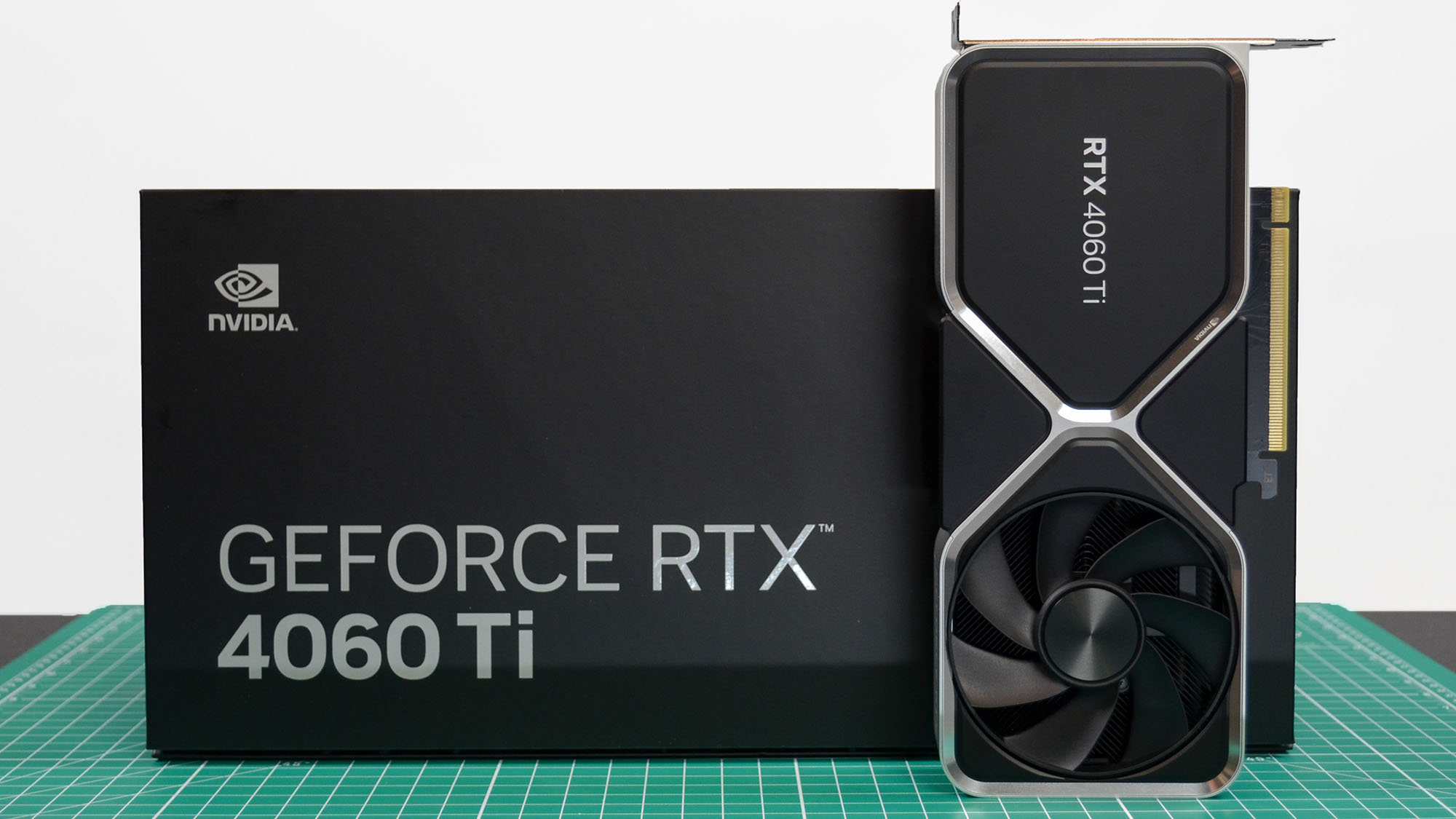
Nvidia GeForce RTX 4060 Ti: two minute review
The Nvidia GeForce RTX 4060 Ti is without a doubt one of the most anticipated graphics card launches of this generation, and now that it's here, it should be an easy win for Nvidia over archrival AMD. I wish that were the case.
That's not to say that the RTX 4060 Ti doesn't hold up well against AMD's midrange offerings at the moment, it absolutely does, and there's no question that the features this card brings to the table are impressive, especially DLSS 3, which is the first time a properly midrange GPU (under $500/£500/AU$750) is seeing this feature.
It goes without saying that Nvidia is leaning into DLSS 3 as its biggest selling point, and as I'll get into later, it definitely delivers significantly better performance than the RTX 4060 Ti should be capable of given its various specs — even factoring in the expanded cache which widens up the memory bandwidth of the card despite still having just 8GB GDDR6 VRAM to work with.
The decision to go with 8GB VRAM for this card — a 16GB VRAM variant is going to be released in July 2023 for an MSRP of $499 (about £400/AU$750) — is probably the only thing that kept the price on this card under $400. With an MSRP of $399 (about £320/AU$600), the Nvidia Founders Edition RTX 4060 Ti 8GB is the same price as the Nvidia GeForce RTX 3060 Ti it is replacing, and generally, it offers a pretty good value for that money, with some caveats.
In terms of native, non-DLSS performance, there isn't a whole lot of improvement over the previous generation, which is definitely going to disappoint some, if not many. Given the kinds of performance advances we've seen with higher-end cards, we were hoping to see that extend down into the heart of the midrange, but it seems those benefits generally stop at the Nvidia GeForce RTX 4070.
Instead, you have a card that relies very heavily on DLSS for carry its performance over the line, and where it works, it is generally phenomenal, offering a real, playable 1440p gaming experience, and even brushing up against some decent 4K performance with the right settings.
This is something AMD has really struggled to match with its FSR, and so Nvidia really has a chance to score a major blow against AMD, but as we'll see, the best AMD graphics card in the last generation's midrange, the AMD Radeon RX 6750 XT, actually outperforms the RTX 4060 Ti in non-ray tracing workloads, including gaming, so this does not bode well for Nvidia once AMD releases its current-gen midrange cards.
This is somewhat exacerbated by the fact that the RTX 4060 Ti's ability to use its new features is fairly limited, and while features like DLSS 3 with Frame Generation are available on the best PC games like Cyberpunk 2077 and Returnal, as of the launch of the RTX 4060 Ti, there are only 50-ish games that support DLSS 3.
This list will surely grow over time, but you certainly won't get this kind of support on games that may be just recent enough to push the RTX 4060 Ti in terms of its performance, while being just old enough that you'll never see a DLSS 3 patch for it.
I can say that if you're coming from an RTX 2060 Super or older, then this card is absolutely going to blow your mind. It's effectively the RTX 3060 Ti's NG+, so if you missed what I consider to be the best graphics card of the last generation, you'll get all that and more with the RTX 4060 Ti. If you're coming from an Nvidia Ampere card though — especially from greater than the RTX 3060 Ti — chances are you are going to find this is really a downgrade with some neat features to soften the blow.
Nvidia GeForce RTX 4060 Ti: Price & availability
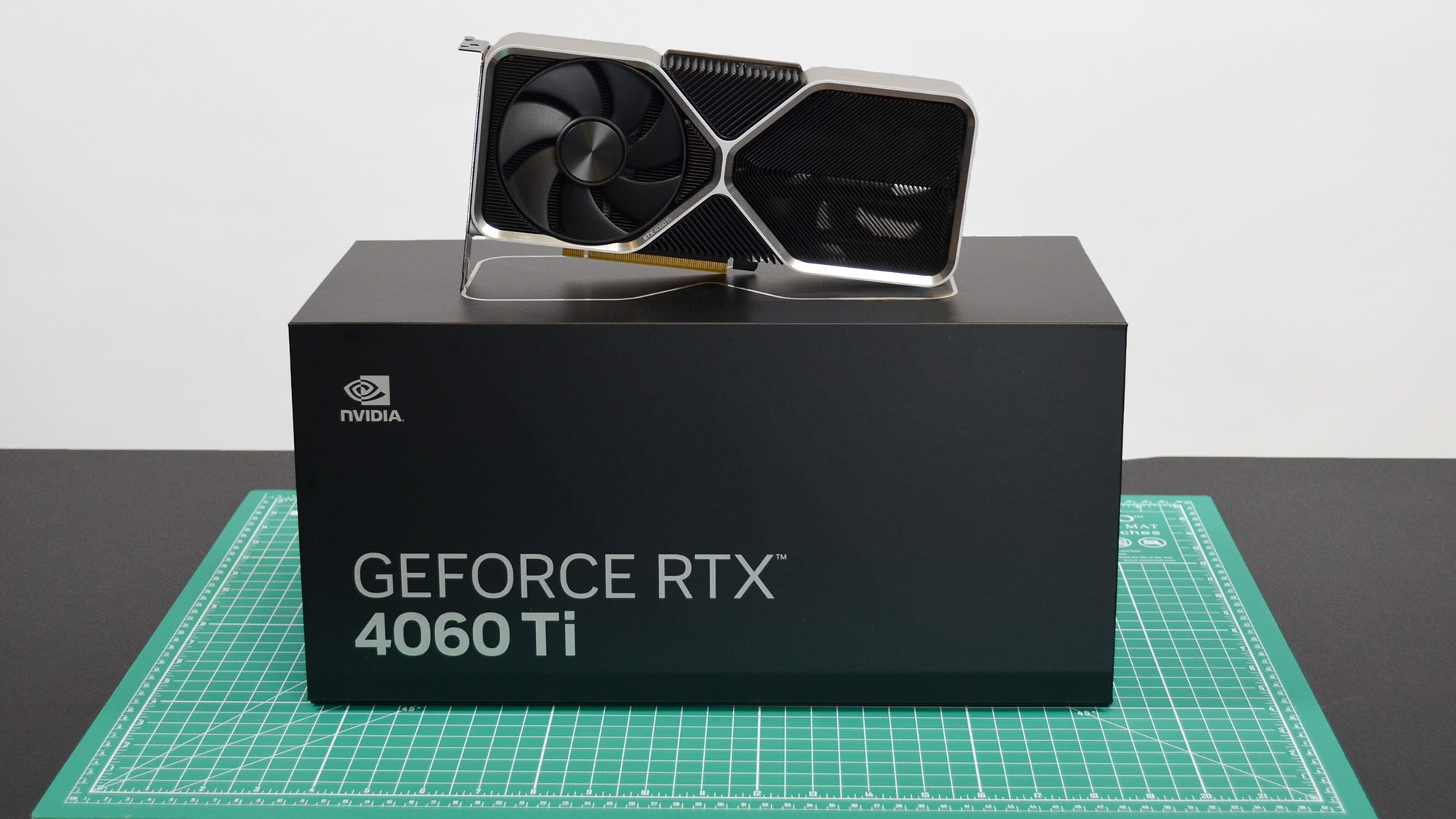
- How much is it? MSRP listed at $399 (about £240, AU$600)
- When is it out? It is available starting May 24, 2023
- Where can you get it? You can buy it in the US, UK, and Australia
The Nvidia GeForce RTX 4060 Ti 8GB is available starting May 24, 2023, with an MSRP of $399 (about £240, AU$600). This is the same launch price of the Nvidia RTX 3060 Ti that this card is replacing, so we're glad to see that Nvidia didn't increase the price on this variant with this generation.
This also puts it on par with the AMD Radeon RX 6750 XT, which initially launched for $549 (about £440/AU$825), but which you can find under $400 right now, even without discounts, at major retailers. AMD hasn't released an RX 7700 XT yet, which would be this card's more natural competition, so comparing the RX 6750 XT and the RTX 4060 Ti isn't really fair, but it's all we have for now until AMD launches its RTX 4060 Ti challenger.
Nvidia GeForce RTX 4060 Ti: Features and chipset
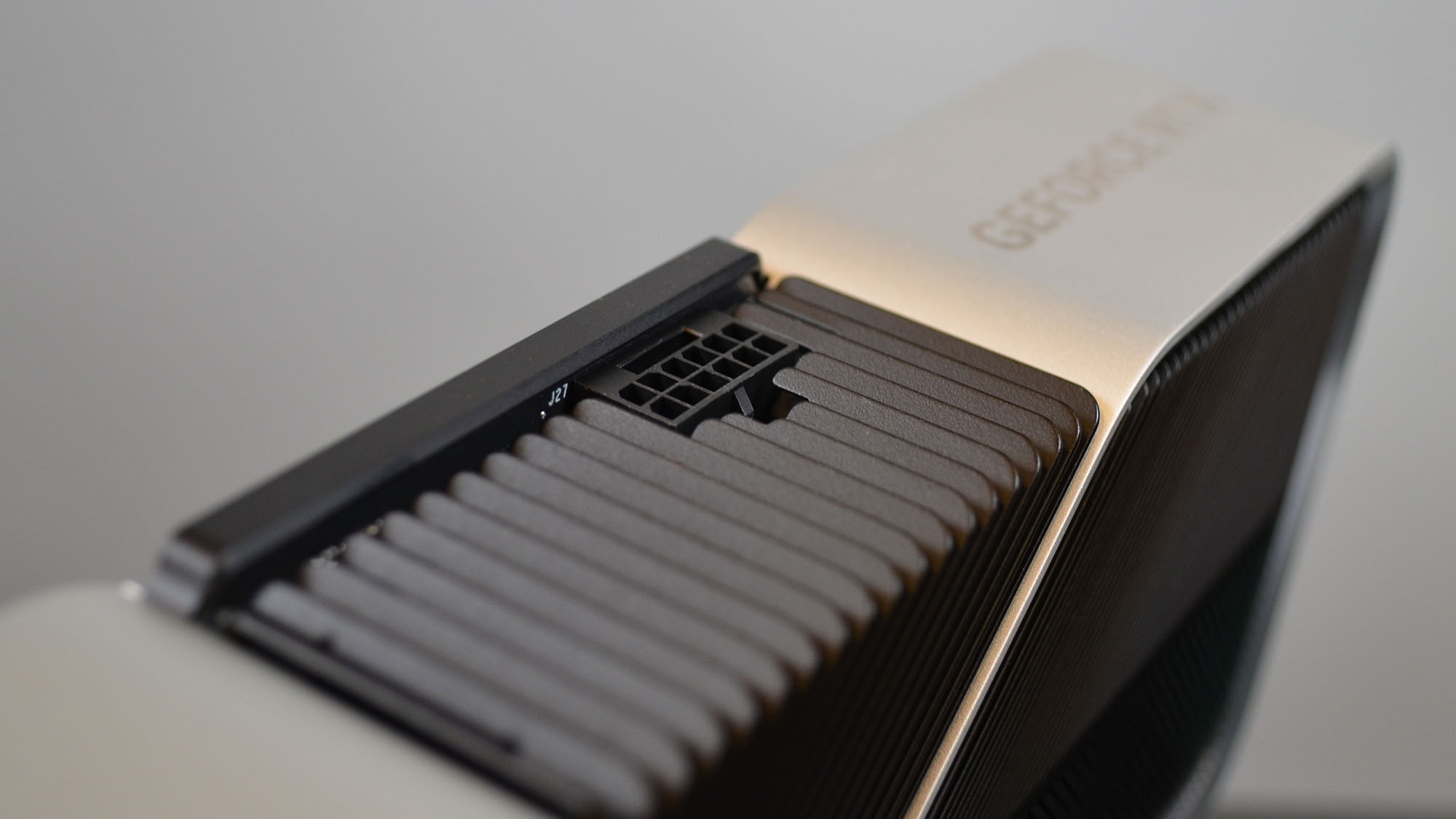
- Only uses one 8-pin...but still requires a 16-pin converter?
- 3rd-generation ray tracing and 4th-generation tensor cores
- 288.0 GB/s memory bandwidth, but 32MB L2 cache boosts effective bandwidth to 554.0 GB/s (according to Nvidia)
The Nvidia RTX 4060 Ti is the first properly midrange Nvidia Lovelace graphics card, and so it is built on TSMC's 5nm process, with about 22.9 billion transistors across 34 streaming multiprocessors (SM), which come with 128 shader cores (CUDA), 4 fourth-generation tensor cores, and 1 third-generation ray tracing core per SM.
The clock speed is a solid 2,310MHz base clock, which is about a 64% improvement over the RTX 3060 Ti's 1,410MHz, with a boost clock of 2,535MHz, or about 52% faster than the RTX 3060 Ti's 1,665MHz.
The biggest difference between the two cards is the memory bus. The Nvidia RTX 4060 Ti uses a 128-bit bus for 8GB GDDR6 VRAM, while the RTX 3060 Ti uses a 256-bit bus for the same amount of VRAM. The RTX 4060 Ti has a faster memory clock (2,250MHz), which combined with the expanded L2 cache (32MB), the RTX 4060 Ti has a slightly faster effective memory speed of 18 Gbps to the RTX 3060 Ti's 15 Gbps, while having a much faster effective memory bandwidth.
Still, this really does smack of over-engineering. The move to a 128-bit bus doesn't seem necessary, and given what we've seen of other Lovelace cards, like the Nvidia GeForce RTX 4070, I definitely think Nvidia could have stuck with a higher bus width and it wouldn't be catching nearly the grief it is getting over this.
What's more, even though the performance of the RTX 4060 Ti is better than the RTX 3060 Ti, I really think that had this card had the same bus width as the RTX 3060 Ti, this card would absolutely anything that approached it in the midrange. As it stands, the RTX 4060 Ti is great, but fails to score the knockout it really needed.
It is worth mentioning though that this card also uses significantly less power than the RTX 3060 Ti. That card had a TGP of 200W, while the RTX 4060 Ti 8GB comes in at 160W, which is a 20% improvement in efficiency. This is great for keeping your build under 600W, and it's a move in the right direction for everyone and deserves to be praised.
Nvidia GeForce RTX 4060 Ti: Design
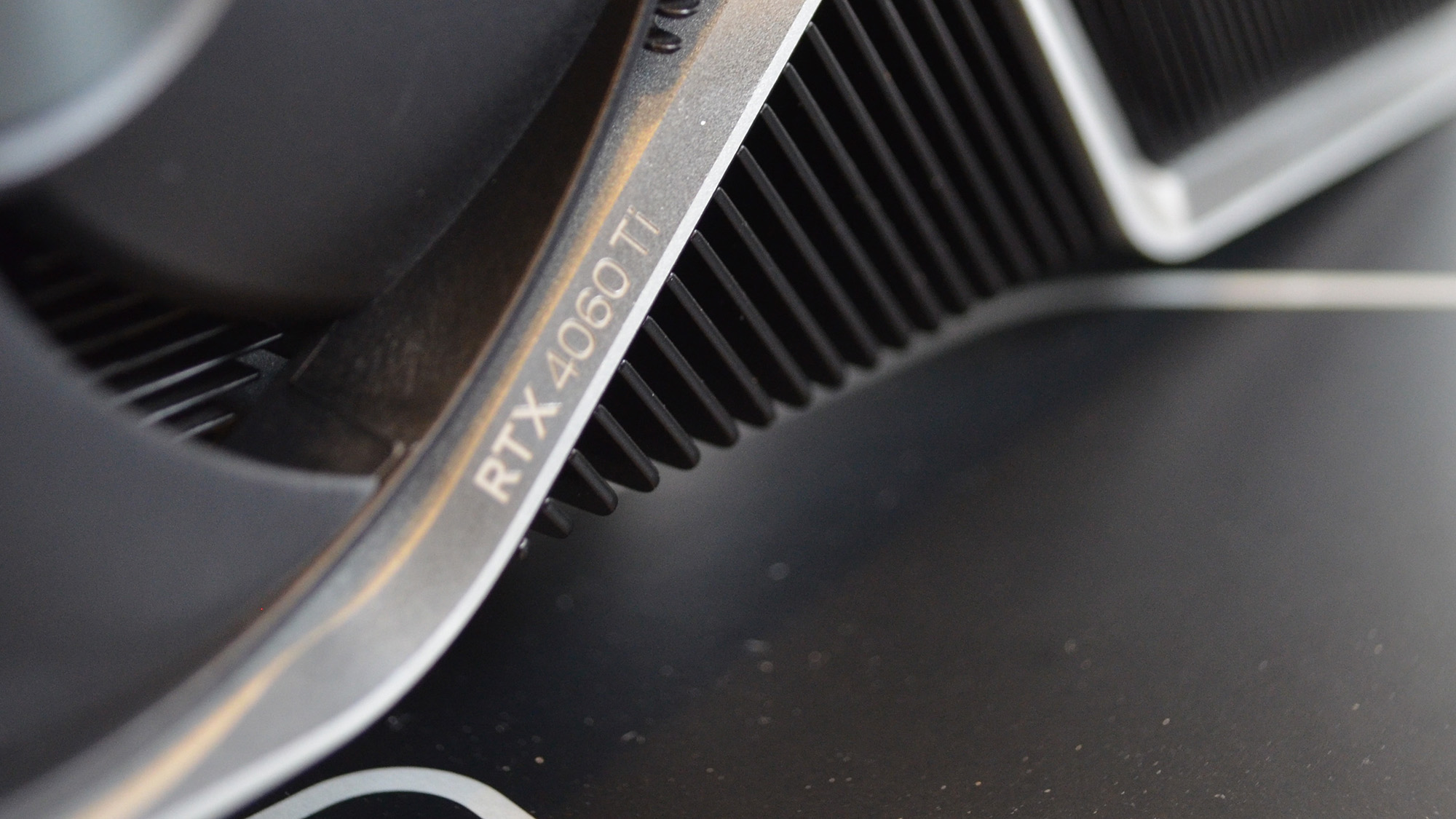
The Nvidia RTX 4060 Ti Founders Edition keeps the same black heatsink with chrome trim as the other Founders Edition cards this generation, and — unfortunately — it also sticks with the 12VHPWR 16-pin power connector. Fortunately, you only need to plug a single 8-pin into it, so it is at least somewhat easier to manage in a case.
Also easier to manage is the size of the card. Using the same dual-fan design as previous Founders Edition cards, the RTX 4060 Ti pretty much shrinks these down a bit. While it's still a dual-slot card, it comes in at just under 9.5 inches long and 4.5 inches tall, making it the kind of card that will easily fit in your case.
There's not much flash here, but that's a given with the Founders Edition, so if you're looking for visual bells-and-whistles like RGB or super-cooling features like a triple fan design, you're going to want to look at any of the third-party cards that release alongside this one for those.
Nvidia GeForce RTX 4060 Ti: Performance
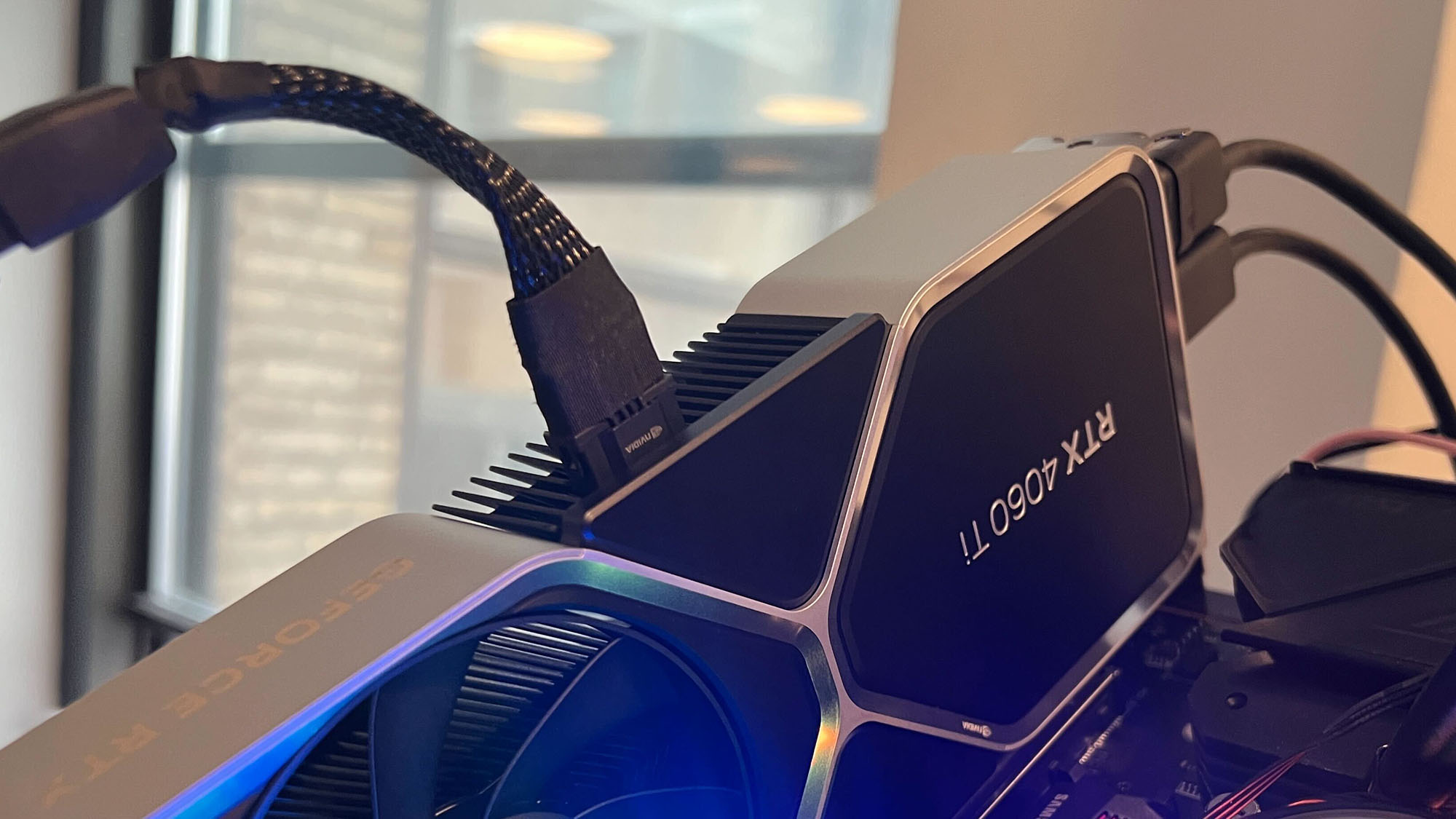
- DLSS 3 is the real draw here
- Improved ray tracing performance
- Baseline performance not much improved over the RTX 3060 Ti
When it comes to performance, the Nvidia GeForce RTX 4060 Ti really leans on DLSS 3 for most of its major performance gains, and while this can be substantial, some are going to feel somewhat disappointed.
This is the system we used to test the Nvidia GeForce RTX 4060 Ti:
CPU: Intel Core i9-13900K
CPU Cooler: Cougar Poseidon GT 360 AIO
RAM: 64GB Corsair Dominator Platinum RGB DDR5-6600MHz
Motherboard: MSI MAG Z790 Tomahawk Wifi
SSD: Samsung 990 Pro 2TB NVMe M.2 SSD
Power Supply: Corsair AX1000
Case: Praxis Wetbench
This is largely because even with the introduction of some pretty advanced tech, there aren't a lot of games out right now that can really leverage the best features of this card. While three of the games I use as benchmarks — F1 2022, Cyberpunk 2077, and Returnal — all feature frame generation, these are also three of the latest games out there from major studios that have the time and staffing to implement DLSS 3 with Frame Generation in their games.
There is a DLSS 3 plug-in coming for Unreal Engine, which should definitely expand the number of games that feature the tech, that's still going to be a ways off at this point before that starts to trickle down to the gamers who will actually be using this card.
I'll get more into DLSS 3 and Frame Generation in a bit, but a quick glance over the underlying architecture for the RTX 4060 Ti tells something of a story here, as shown by synthetic benchmarks using 3DMark and Passmark 3D.
Synthetic Benchmarks
As you can see, the RTX 4060 Ti beats out the RTX 3060 Ti, but only just barely, getting about 11% better performance than the card it's replacing. This is, okay, I guess, but hardly the generational leaps that previous Lovelace cards have been making.
For example, the RTX 4070 offers a roughly 21% jump over the RTX 3070 on these same synthetic benchmarks. In fact, this puts the RTX 4060 Ti just ahead of the RX 6750 XT, and ultimately just behind the RTX 3070 in terms of raw performance.
As a gaming card, the performance outlook is better, but not by a whole lot overall.
Gaming Benchmarks
On games with heavy effects-based visuals like Metro: Exodus and Cyberpunk 2077 where the advanced architecture of the RTX 4060 Ti can be leveraged, it does edge out the competition, sometimes. The RX 6750 XT still manages a slightly better fps on Returnal at 1080p, on average, when not using ray tracing or upscaling tech, for example.
The RTX 4060 Ti also gets crushed in CS:GO at 1080p, relatively speaking, which I chalk up entirely to pushing textures through the smaller memory bus of the RTX 4060 Ti. The 192-bit bus on the RX 6750 XT's 12GB GDDR6 VRAM and the 256-bit bus on the RTX 3060 Ti's 8GB GDDR6 really show up in cases like this.
Things do start to turn in the RTX 4060 Ti's favor once you start fiddling with ray tracing. The third-generation ray tracing cores on the RTX 4060 Ti are definitely much more capable than the RTX 3060 Ti's and especially more than the RX 6750 XT's, which are second-generation and first-generation cores, respectively.
The RTX 4060 Ti is the first midrange card I've tested that is going to give you playable native ray-traced gaming at 1080p consistently on max settings, though it will struggle to get to 60 fps on more demanding titles like Cyberpunk 2077.
But lets be honest, nobody is playing any of these games with native resolution ray tracing, you're going to be using an upscaler (and if you aren't then you really need to start).
Here, the performance of Nvidia's DLSS really shines over AMD's FSR, even without frame generation. In both Cyberpunk 2077 and Returnal, the RTX 4060 Ti can get you over 120 fps on average when using the DLSS Ultra Performance preset, and if you want things to look their best, you can easily get well north of 60 fps on average with every setting maxed out, even ray tracing.
Now, one of the things that the wider memory bus on the RTX 3060 Ti gave that card was a faster throughput when gaming at 1440p. Now, not every game is going to run great at 1440p, but for a lot of them, you're going to be able to get a very playable frame rate.
The RTX 4060 Ti improves over the RTX 3060 Ti here, but not nearly as much as it should, and on games like F1 2022 and CS:GO where that memory bandwidth difference is going to show, well, it shows up here at 1440p, too.
Of course, once you turn on ray tracing, most games are going to turn into a slide show, but unsurprisingly, the RTX 4060 Ti manages to score a win here on every ray-traced game I tested.
That said, you are really pushing it here on these settings, and you're better off using upscaling if you're going to go for 1440p, especially with settings turned up.
The biggest win for the RTX 4060 Ti here is with Cyberpunk 2077, where it manages 67% better performance at max quality settings than the RX 6750 XT, but maddeningly, it's only about 13% better than the RTX 3060 Ti on the quality preset. On ultra performance, the RTX 4060 Ti is about 52% better than the RX 6750 XT, but again, only 13% better than the RTX 3060 Ti.
When it comes to Returnal, the RX 6750 XT is essentially tied with the RTX 4060 Ti on the quality preset for FSR 2.1 and DLSS, respectively. Bump this up to ultra performance, and the RTX 4060 Ti does better, beating out the RX 6750 XT by about 22% and the RTX 3060 Ti by about 17%.
I imagine the RTX 4060 Ti will perform more or less the same across most games that still rely on DLSS 2.0, which number more than 200. For those games that really leverage DLSS 3 with Frame Generation though, it really is another story entirely.
With Frame Generation, you can get about a 40-60% performance improvement on games that support it. This isn't nothing, since this can even get you playing Cyberpunk 2077 at a playable framerate at 4K on ultra performance. The RTX 3060 Ti and RX 6750 XT really don't have any answer to this, and so they are going to lag behind considerably on any games that have DLSS 3 with Frame Generation.
Does Frame Generation increase latency on some titles, along with other issues? Sure. Will it matter to gamers who get to play Cyberpunk 2077, Returnal, and other titles that play like they were RTX 3080 Ti's? Probably not.
Will any of this matter to anyone who doesn't play those games? Obviously not. And that is ultimately the issue with this card. For what it does well, it has no peer at this price, but if you already have an RTX 3060 Ti, then there is really very little reason to upgrade to this card. Hell, if you have an RX 6750 XT, you might feel like you're better off just waiting to see what AMD has in store for the RX 7700 XT, and I would not blame you in the slightest.
This isn't a whiff by Team Green by any means, but there's no getting around the fact that the performance of the Nvidia GeForce RTX 4060 Ti absolutely leaves a massive opening for AMD to exploit in the coming months with the RX 7700 XT, or even the RX 7650 XT.
Should you buy the Nvidia GeForce RTX 4060 Ti?
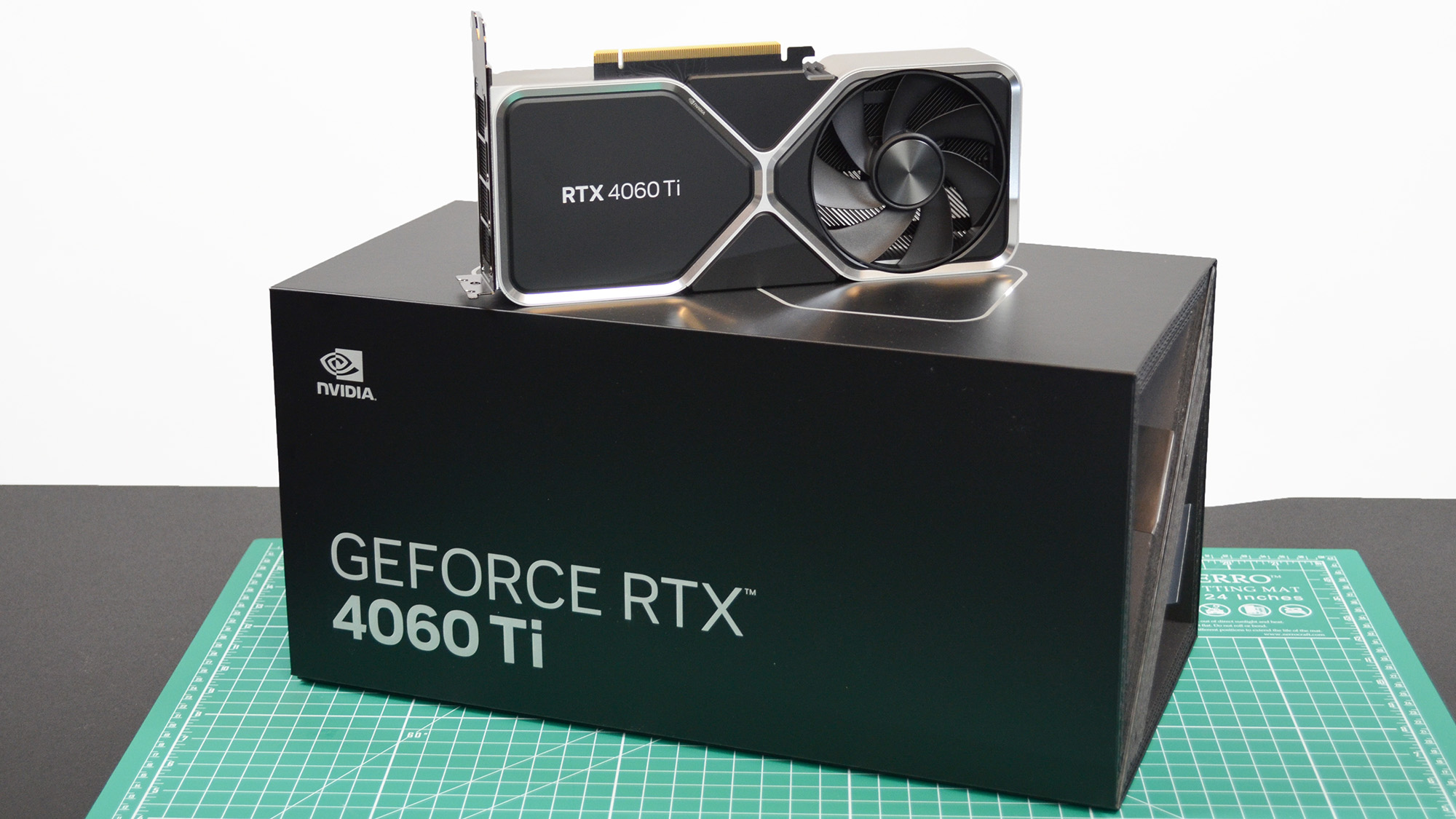
Buy it if...
Don’t buy it if…
Also consider
How I tested the Nvidia GeForce RTX 4060 Ti
I spend several days with the RTX 4060 Ti running benchmarks, playing games, and generally measuring its performance against competing cards.
I paid special attention to its DLSS 3 Frame Generation technology, since this is one of the card's biggest selling points, and played several games at length with the tech turned on.
Having covered and tested many graphics cards in my career, I know how a graphics card perform at this level.







